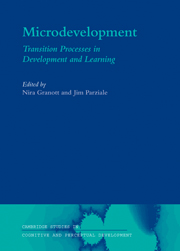Microdevelopment
Microdevelopment is the process of change in abilities, knowledge and understanding during short time-spans. This book presents a new process-orientated view of development and learning based on recent innovations in psychology research. Instead of characterising abilities at different ages, researchers investigate processes of development and learning that evolve through time and explain what enables progress in them. Four themes are highlighted: variability, mechanisms that create transitions to higher levels of knowledge, interrelations between changes in the short-term scale of microdevelopment and the crucial effect of context. Learning and development are analysed in and out of school, in the individual's activities and through social interaction, in relation to simple and complex problems and in everyday behaviour and novel tasks. With contributions from the foremost researchers in the field Microdevelopment will be essential reading for all interested in cognitive and developmental science.
Reviews & endorsements
"The task of attaining optimal outcomes for learners from a range of cultural backgrounds remains a major social challenge. The research program outlined in Microdevelopment could help us meet that challenge." - David MacLennan, Ph.D. The University College of the Cariboo
Product details
March 2009Paperback
9780521103282
368 pages
229 × 152 × 21 mm
0.54kg
8 tables
Available
Table of Contents
- Introduction: Microdevelopment Nira Granott and Jim Parziale
- Part I. Variability:
- 1. Microgenetic srudies in self-explanation Robert S. Siegler
- 2. Microdevelopment and dynamic systems: Applications to infant motor development Esther Thelen and Daniela Corbetta
- 3. Looking at the hands through time: A microgenetic perspective on learning and instruction Susan Goldin-Meadow and Martha Wagner Alibali
- Part II. Transition Mechanisms:
- 4. A multi-component system that constructs knowledge: Insights from microgenetic study Deanna Kuhn
- 5. Bridging to the unknown: a transition mechanism in learning and development Nira Granott, Kurt W. Fischer and Jim Parziale
- 6. Observing the dynamics of construction: children building bridges and new ideas Jim Parziale
- Part III. Micro- and macrodevelopment:
- 7. Interacting time scales in personality (and cognitive) development: intentions, emotions and emergent from Marc D. Lewis
- 8. How microdevelopment creates macrodevelopment: reiterated sequences, backward transitions and the Zone of Current Development Nira Granott
- 9. Macro- and microdevelopment research: assumptions, research strategies, constraints and utilities Kang Lee and Annette Karmiloff-Smith
- Part IV. Context:
- 10. Notebooks as windows on learning: the case of a science-into-ESL programme Rochel Gelman, Laura Romo and Wendy S. Francis
- 11. Darwin's construction of the theory of evolution: microdevelopment of explanations of variation and change in species Kurt W. Fischer and Zheng Yan
- 12. Developmental dynamics, intentional action and fuzzy sets Paul Van Geert
- Indexes.







